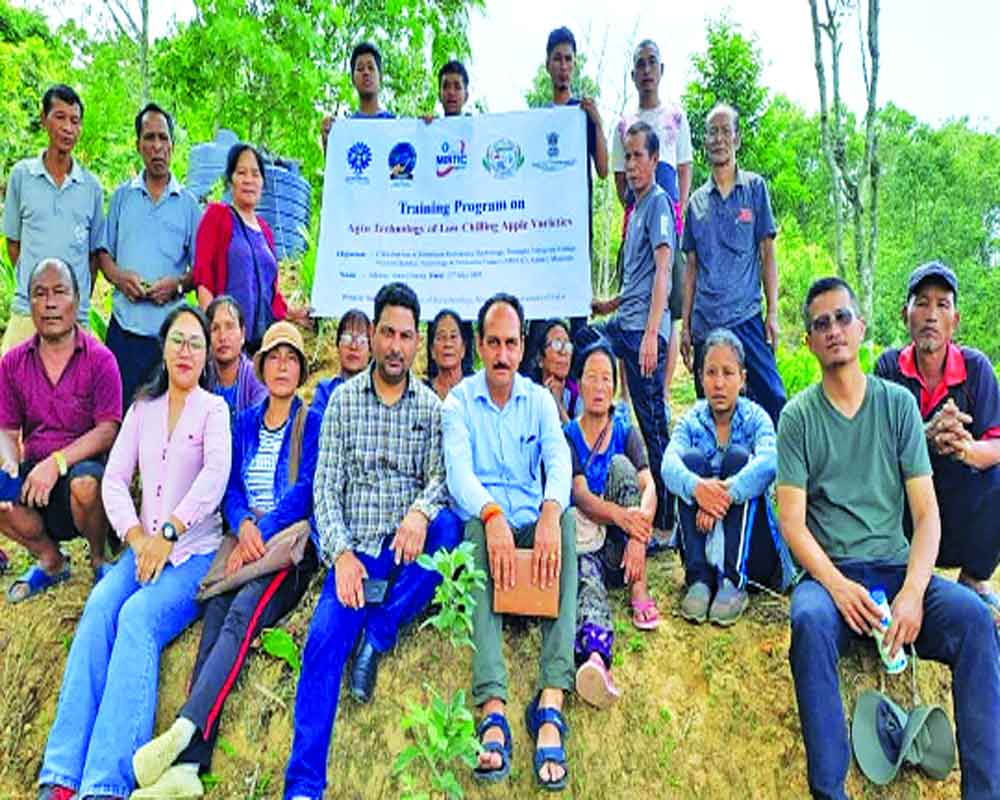Encouraged by the success of its pilot project on apple cultivation in Mizoram, a first in the Northeastern States, scientists from the country’s top research agency, the Council of Scientific and Industrial Research (CSIR), have devised an ambitious plan to expand the cultivation of high-revenue, low-chilling fruit crops in the region, aiming to boost the income of local communities.
This initiative also means that locals won’t have to import the fruit from other States, thereby reducing carbon footprints through transportation, as highlighted by Dr Rakesh Kumar, Senior Principal Scientist from CSIR’s Institute of Himalayan Bioresource Technology (IHBT) in Palampur. IHBT has been tasked with spearheading apple cultivation in the region.
Dr Rakesh Kumar reflected on the success, stating, “Our experiment, involving the planting of the low-chilling apple variety in 2022, has yielded positive results.
While this has encouraged scientists like him to take more such initiatives, locals also seem to be enthusiastic about apple cultivation, considering these crops as a cornerstone of sustainable agriculture and a response to the threats posed by climate change.
“We have identified some potential locations for cultivation in this North-eastern State. To implement these interventions/ technologies, CSIR-IHBT has collaborated with Mizoram Science Technology and Innovation Council in Aizawl (MISTIC), Mizoram, and the College of Horticulture in Thenzawl, Mizoram (CAU, Manipur),” added Er Mohit Sharma, a Chemical Engineer and Principal Scientist who is part of the team for Mizoram initiatives.
Earlier this month, our team visited Mizoram to monitor the growth of aromatic plants and low-chilling varieties of apples, conducting training programmes in various locations, including the College of Horticulture, as mentioned by Dr Rakesh Kumar.
He explained that the region has the potential to produce low-chilling apple types such as Anna, Dorset Golden, Sun Fuji, and others, as these varieties do not require additional and very cold temperatures to flourish.
“Unlike traditional apple varieties, like those grown in Kashmir, which require about a thousand to fifteen hundred hours of chilling, the ones we have introduced in the North East require just about three hundred to five hundred hours of chilling,” explained the scientist.
Meanwhile, Dr Sudesh Kumar Yadav, Director of CSIR-IHBT in Palampur, added that apple cultivation is one of the three projects sanctioned to them by the Department of Biotechnology under the Inter-Institutional Programme to support the development and sustainable utilisation of bioresources in Mizoram. “We are also involved in the promotion of Shiitake and Oyster mushroom cultivation, as well as high-value aromatic crops, in addition to cultivating low-chilling varieties of apples.”
In villages like Khanpui in the Aizawl district, scientists are directly engaging with local apple farmers, assisted by the senior scientific officer of MISTIC, Dr Davy Lalruatliana.
Through immersive training sessions, farmers are gaining crucial insights into apple cultivation, pruning techniques, training methods, nutrient management, and the meticulous creation of irrigation basins and pits.
“This strategic initiative aims to equip farmers with the latest knowledge and skills necessary for successful low-chilling apple cultivation,” informed the scientist.


























